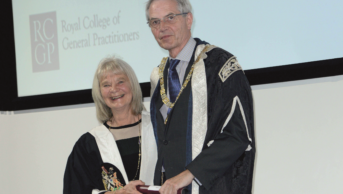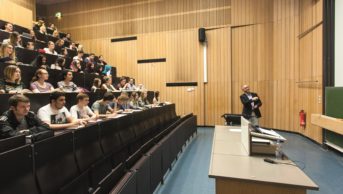
istockphoto.com
It is an oft repeated mantra that research should be embedded into clinical practice. In 2014, it became easier for pharmacists to do just that, because they were able to apply for clinical academic research funding from the National Institute for Health Research (NIHR) for the first time. Deputy chief pharmacist Cathy Geeson was one of nine pharmacists to pursue the opportunity — and recently discovered she was the only one to be successful. She is encouraging other clinicians with enthusiasm for research to apply for NIHR funding — which allows healthcare practitioners to undertake an applied clinical research project that will be of benefit to patients within five years of its completion.
The integrated clinical academic programme
The NIHR and Health Education England (HEE) clinical academic training programme, which was opened to pharmacists for the first time in 2014 and offers a master’s and a doctorate scheme, has been revamped again. Now labelled the HEE/NIHR integrated clinical academic programme, the scheme is open to all non-medical and non-dental registered healthcare professionals, with some exceptions. In addition to the master’s and doctorate schemes, candidates can now also apply for clinical lectureship and senior clinical lectureship programmes.
Peter Thompson, senior manager at the NIHR trainees coordinating centre, explains: “The master’s scheme (MRes) works differently to the other schemes within the integrated clinical academic programme, in that Higher Education Institutes (HEIs) have to apply to the NIHR for funding to host the master’s places. Applications for students will open in late spring to early summer.”
A list of the participating institutes will be available from the NIHR website, with a named individual that the applicant can contact directly, according to Thompson. “HEE then funds the master’s place and the HEI provides backfill cost to the NHS organisation where the student is based. The master’s scheme is competitive, so applicants should demonstrate a keen interest in research and mention their relevant experience.”
It was the master’s scheme that first interested Geeson, who was studying for her MSc at University College London (UCL) when she spotted a news story about the funding in The
Pharmaceutical Journal
. “I had a project I wanted to deliver, which was important in terms of outcomes for the NHS. I had whetted my appetite for research with the MSc and had enjoyed it so much I wanted to take it further. Initially, I wanted to apply for the MRes but, since I was already doing my MSc at UCL, I convinced myself to go a little bit further and apply for the PhD,” she says.
Merging the clinician and the academic
The emphasis in the integrated clinical academic programme is on embedding research into practice. Doctoral applicants must have been a practising clinician for at least a year, and should have some research experience, says Thompson. “An example of this might be a master’s qualification, but it doesn’t have to be,” he adds.
The application process requires the candidate to be committed to a clinical academic career beyond the duration of the PhD. “The programme is looking for someone who will be a potential research leader of the future, inspiring future research across the NHS,” emphasises Geeson. “The Fellowship is about embedding research into practice and developing you as a clinician — they don’t want someone who will leave the NHS for academia, but instead will become a clinical academic.”
Finding the right support
As part of their application, candidates must therefore facilitate a partnership between an NHS trust and an HEI; “the better the ties, the better the application,” stresses Thompson. Applicants must also identify their own clinical and academic supervisors, who may or may not work at one of these host organisations.
Thompson also advises applicants to talk to the NIHR research design service, which is spread throughout the UK in regional offices. He says the service can firstly help you decide whether to opt for the master’s, doctoral or lectureship stream, and then give you advice on your research. “You should speak to them as soon as you can, not a week before you need to submit your application,” he adds.
One important factor in Geeson’s success was having the right support around her, she says. “I had to build up the right support network, which involved figuring out who to contact, how to contact them and how to engage them. This involved a lot of cold calling. But I managed to build up a support network, and without its guidance and expertise my application would not have been successful,” she explains, adding that the responses she received helped to keep her motivated.
Geeson, who has two academic supervisors and two clinical supervisors, identified one of them by searching online for academics who had declared an interest in topics similar to her PhD idea. One name kept coming back to her: Bryony Dean Franklin, executive lead pharmacist, research, at University College London.
“Cathy approached me with her ideas for a PhD project and I was impressed both with her enthusiasm and her research proposal, which was well thought through and very relevant to pharmacy practice,” says Dean Franklin.
Deciding on a project
The proposal Geeson put forward is to develop and assess a tool that will help hospital pharmacists target scarce resources to those patients who need them most. “The results of my project will bring value for the NHS and the project is deliverable,” she says.
In general, Thompson explains, candidates’ projects must fall within both the NIHR remit and the HEE mandate for research, but there is a lot of overlap between the two. At a recent event at the Royal Pharmaceutical Society (RPS), which aimed to address barriers to research for pharmacists, Peter Noyce, emeritus professor of pharmacy practice at Manchester University, described the type of research that the NIHR is interested in. “This is near-patient research — this is not about designing new drugs,” he said. “This research, and a whole section of the application form, requires patient and public involvement.”
Thompson emphasises the importance of understanding the methodology in your research proposal. “For example, some candidates receive help with the part of their application that deals with statistics,” he says. “They would need to be able to explain [this methodology] at interview, even if this will form part of their training.”
As part of his or her application, each candidate must also submit a tailored training and development plan for him or herself alongside the research plan.
Supervising a project
Noyce was part of the shortlisting panel that reviewed applications and chose candidates for interview. Speaking at the research event, he explained that there are real challenges for individuals who want to supervise applicants. “Both clinical and research supervisors need to demonstrate success in supervision [and] both should have a record of achievement in relevant practice,” he said.
Additionally, he said that the Fellowship funding bodies do not favour situations where supervisors have huge teams of students, because they are then unable to dedicate the necessary time to each student. He recommended a maximum of four students per supervisor.
Supervisors should also give thought to making sure that there are credible and coherent arrangements for supervising Fellowships, Noyce said. “People are endlessly imaginative,” he noted, “It wasn’t quite this bad but, for example, [a candidate] would have his or her research base in Exeter, and clinical base in Newcastle… and the person themselves is based in rural Shropshire. So make yourself credible and cogent.”
Tips for completing the form
The overall message for those completing the application in 2015 is to be prepared and address exactly what the NIHR is looking for. Thompson says it is important to read the guidance “very well — it is long and it can be tedious, but it is important to understand the process.”
Geeson says: “Guidance from the NIHR said that the proposal should consider the person applying, the place the research would be conducted and the project itself, with equal judgement given to each.”
Dean Franklin adds that Geeson “took the time to really work out what the funders would be looking for, and ensured she addressed the relevant aspects.”
The application required a lot of work and dedication, Geeson says. “I found the biggest challenge was applying from a standing start,” she reflects. “At the time I applied, I understood little of the process. Although I was completing my MSc at UCL, which had a research element so I had some underpinning knowledge from that, I knew nothing about applying for funding.”
She explains that she also attended training sessions run by the NIHR. “In one workshop I attended, they discussed what helps to get a project funded, which included the importance of the research question, the quality of the research, whether it is likely to have a strong impact on patients, whether you have a good team and whether it is cost-effective,” she says.
David Jones leads on academic training in the NIHR infrastructure. “Tell a narrative,” he told the audience at the RPS research event. “How did you come to this point in your career? Make it interesting to people.”
Additionally, he highlighted the importance of paying attention to detail. “Two years ago, on the doctoral research fellowship panel, there was an application that still had a PDF document attached, that still had tracked changes. In the tracked changes, there was a comment from a supervisor saying ‘this is crap’,” he said. “Sloppy presentation… equals a sense that it will be sloppy science.”
Dean Franklin elaborates: “The funders are looking to support very high calibre individuals with well thought out research proposals underpinned by excellent organisational and supervisory support.”
“Most of all, though, start early,” she adds. “Putting together a robust proposal, a suitable supervision team, [gaining] patient and public involvement, and ensuring all the paperwork is completed to a high standard can take 6–12 months.”
The closing date for this year’s applications is 1pm on 28 May 2015.


